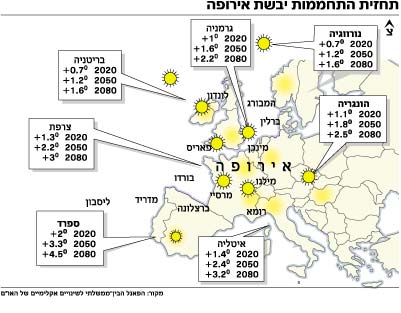The heat wave in Europe in scientific controversy: the greenhouse effect or a one-off event?
Yuval Dror

Forecast of continental Europe warming - map
The workers in the Netherlands flooded the workers' committees with questions; The main one was whether they are allowed to stay at home when it is so hot outside. The answer was "No, but you are allowed to come to work in shorts". In London, pedestrians turned the small pond in Trafalgar Square into a swimming pool, and the penguins in the zoos received fish-flavored treats. "Britain will cook", the newspapers wrote, expecting a new record of 100 degrees Fahrenheit (37.7 degrees Celsius) which would break the previous record from August 1990 - 98.8 degrees (37.1 degrees Celsius). In Spain, 12 people died from the severe heat and the authorities report about a million chickens that died in the heat. In Italy they warned of power outages due to the increased electricity consumption.
Following the extreme weather, a stormy debate emerged among the scientists: does the hot summer herald the fulfillment of the gloomy predictions regarding the changes the world is going through as a result of the man-made greenhouse effect; Or is it a one-off event that should not be used to influence a global trend.
An international report published two years ago by the "Intergovernmental Panel on Climate Change" at the United Nations states that in the 20th century an average increase of 0.8 degrees was recorded. In addition to this, the panel determined that the last decade of the 20th century was the hottest in Europe since regular measurements of heat degrees began. "The weather we are experiencing now is in line with what is going to happen in the coming decades," said John Terpenny, from the "Tyndale" Center for Climate Change in Great Britain in an interview with "New Scientist" magazine Prof. John Shellenhuber, who is considered one of the most prominent scientists in the field of climate , told the New Zealand Mail and Gurdian newspaper: "The heat wave that Europe is experiencing is in line with the worst case scenarios that no one wants to think about."
According to Prof. Yosef Yehoyakhin, who specializes in the field of planetary physics from the Department of Geophysics and Planetary Sciences at Tel Aviv University, the Earth has been warming since the 17th century. "There is a constant rise in temperatures, with short waves of warming and cooling," he explained.
Israel may also be harmed by global climate changes, even though it has always been a "victim" of minimal changes in global weather systems. "We are at the edge of a large system, so a shift of a few degrees in the system can be the difference between a rainy year and a dry year. This is also the reason that the rain systems here, unlike in Europe, are short systems of one or two days", explains Yehoyachin.
At this point, it is not clear whether humanity is the cause of the increase in temperature by releasing carbon dioxide (CO2) into the air, or whether it is a natural process that occurs on Earth once every half a million years. "The increase in the CO2 level is the beginning of a process that causes the warming of the sea surface and the rise of water vapor (H2O) into the air," says Yehoyachin. "The water vapor causes additional warming that releases methane gas. This gas absorbs heat radiation 10,000 times more than carbon dioxide. Despite this, it is not clear whether this is a process that humanity causes or whether the earth is warming due to natural events, such as the eruption of volcanoes."
According to Prof. Shellenhuber, there is a small chance that humanity is accelerating and exacerbating the changes in the weather more than expected. "Most of us believed," he said, "that such extreme weather would occur in another 20 or 30 years, but it is occurring now." The UN's World Meteorological Organization stated last month that extreme weather events will only increase and go away.
According to Yehoyachin, the scientists do not know whether the harsh summer that is passing through Europe is part of the general warming trend or a local phenomenon. According to him, the scientists have reliable data on what is happening in the world only from the last 50 years. "It's not enough for us", he explained.
Nevertheless, he agrees with the assumption that the world is facing more extreme weather events. "In a period of warming", he says, "the weather events only worsen. Every unusual event becomes even more unusual, and the more polar the latitudes, the more acute the effects are." And when will the earth stop warming? "No one knows", he says.
